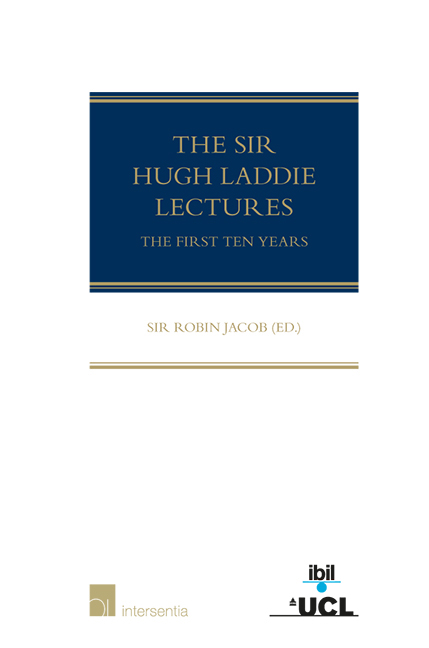Book contents
- Frontmatter
- Preface
- Contents
- List of Contributors
- The Insatiable Appetite for Intellectual Property Rights
- The Function of a Trade Mark: Hugh Laddie and the European Court of Justice
- From National Patent Litigation to a European Patent Court: A Dream, A Wish, or Soon, Reality?
- Killing the Goose that Laid the Golden Egg: Too Many Trade Marks? Use and Intention to Use in EU Trade Mark Law
- The Growing Imperative to Internationalise the Law
- Community Trade Marks: A Swiss Cheese?
- The Culture of the Public Domain: A Good Thing?
- IP and Advocacy
- Patents and Populism
- Towards a Global Copyright Law?
- Apologia Pro Vita Sua: A HiFi Retrospective and a Modest Prospective
- About the Editor
Towards a Global Copyright Law?
Published online by Cambridge University Press: 09 November 2019
- Frontmatter
- Preface
- Contents
- List of Contributors
- The Insatiable Appetite for Intellectual Property Rights
- The Function of a Trade Mark: Hugh Laddie and the European Court of Justice
- From National Patent Litigation to a European Patent Court: A Dream, A Wish, or Soon, Reality?
- Killing the Goose that Laid the Golden Egg: Too Many Trade Marks? Use and Intention to Use in EU Trade Mark Law
- The Growing Imperative to Internationalise the Law
- Community Trade Marks: A Swiss Cheese?
- The Culture of the Public Domain: A Good Thing?
- IP and Advocacy
- Patents and Populism
- Towards a Global Copyright Law?
- Apologia Pro Vita Sua: A HiFi Retrospective and a Modest Prospective
- About the Editor
Summary
WELCOME AND INTRODUCTORY REMARKS
Professor Sir Robin Jacob Good evening, everybody. This is the ninth Sir Hugh Laddie Lecture and I am pleased to say we have kept the standard right up, from the first – and I think I see the first lecturer here – to the ninth. Next year, who knows – you always say that about next year – but I have a suspicion it will be okay.
Shira has kindly agreed to give this talk. The title is perhaps a little aspirational but must be something everybody wants. The fiddly details of each country's copyright laws must be a bloody nuisance. If there is a way of getting rid of those, it would be wonderful. Shira has spent quite a lot of time in this country. She even, to her eternal shame, taught at King's College, but she is repairing that now. Shira, it is your turn to talk.
LECTURE
I am deeply honoured to be back in London to give this year's Sir Hugh Laddie lecture and start by thanking Sir Robin and UCL for their invitation and hospitality.
Let me start, because of my current job, by making clear that I will be giving my own views rather than speaking on behalf of the US Patent and Trademark Office or the Administration. Let me clarify from the beginning that the title of the talk is a question, not a statement. I hate to disappoint the committed advocates for an international copyright code, but, as you will hear, I am not yet ready to join their ranks.
INTRODUCTION
We find ourselves today in a highly globalised world, when it comes to the consumption of entertainment and knowledge products – the subject matter of copyright. This is the outcome of an evolution measured in centuries, which has been dramatically accelerated by the advent of digital networked technology. We should not downplay the continued significance of works tailored to local markets, and the value of cultural diversity – but there is without question great demand for movies, soft ware, books and music that appeal broadly to consumers around the world. Many of these, of course, are produced in the English language – and designed for a mass audience comprised of multiple cultures.
- Type
- Chapter
- Information
- The Sir Hugh Laddie LecturesThe First Ten Years, pp. 175 - 194Publisher: IntersentiaPrint publication year: 2019



